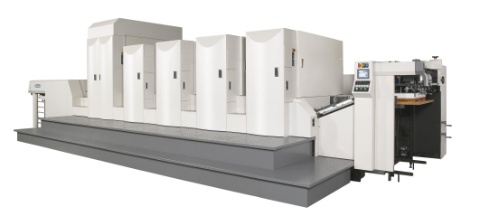Ryobi and Miyakoshi Announce Development of Next Gen 6-up Liquid Toner Sheetfed Digital Press
Press release from the issuing company
TOKYO -- Miyakoshi Printing Machinery Co., Ltd. and Ryobi Ltd. have jointly developed a 6-up, 29-inch liquid toner-based digital printing press. It is the world’s first digital sheetfed press in its class capable of B2-size printing at up to 8,000 sheets per hour.
The new press will be exhibited as a pre-market model at the Miyakoshi booth (Hall 9, Stand A04) at drupa 2012, the world’s largest international print industry trade fair, to be held May 3-16 in Dusseldorf, Germany. Ferrostaal markets and sells RYOBI® printing equipment in the U.S. and Canada.

“This ‘next generation’ printing press is a significant milestone in Ryobi’s 68-year commitment to innovation and the success of printers worldwide,” said John Torrey, president of Ferrostaal Equipment Solutions North America.
Digital printing technology has been attracting wide interest for its ability to handle short-run variable data printing with short lead times, and a variety of digital presses are already on the market. But traditional offset printing technology still offers many advantages over digital printing, including higher printing quality, lower running costs, faster printing speeds and the ability to handle long-run jobs.
This has led to strong demand for a new type of press that combines the strengths of both technologies. Responding to that need, Miyakoshi and Ryobi jointly developed a new type of digital press that enables high-speed printing on media as large as B2 size with quality comparable to that of an offset press.
The new press combines the 1,200 dpi high resolution and ultrafine particle liquid toner electrophotographic technology Miyakoshi demonstrated on a Web press at drupa 2008 with the high-speed sheet feed technology Ryobi has perfected for its sheetfed offset presses.
Through offset transfer of ultrafine particle liquid toner from a photosensitive drum to the media, this new digital press is able to offer high printing quality comparable to offset printing. Although recent advances have been made in commercial inkjet printing quality, this high level of quality is not yet achieved with an inkjet system.
In addition to short-run printing applications such as catalogs, posters and packages, the new B2-size liquid toner-based digital printing press is also ideal for high-quality, large-size variable printing.
Based on the response it receives at drupa 2012, preparations will move toward its market release.
Specifications of the pre-market model to be exhibited at drupa are as follows:
Printing method - Electrophotographic
Resolution - 1,200 x 1,200 dpi
Toner formulation Ultrafine particle liquid toner
Toner supply device - Independent toner supply device (with automatic toner density adjustment function)
Fixing method - Infrared dryer + fuser roll system
Max. printing speed - 8,000 sheets per hour
Max. paper size - 788 x 600 mm (31.02 x 23.62”)
Min. paper size - 410 x 290 mm (16.14 x 11.42”)
Max. printing area - 765 x 580 mm (30.11 x 22.83”)
Paper weight - 64 - 360g/m2 [max. paper thickness = 0.4 mm (0.016”)]
Feeder pile capacity - 800 mm (31.50“)
Delivery pile capacity - 900 mm (35.43”)
- Questions to ask about inkjet for corrugated packaging
- Can Chinese OEMs challenge Western manufacturers?
- The #1 Question When Selling Inkjet
- Integrator perspective on Konica Minolta printheads
- Surfing the Waves of Inkjet
- Kyocera Nixka talks inkjet integration trends
- B2B Customer Tours
- Keeping Inkjet Tickled Pink
© 2024 WhatTheyThink. All Rights Reserved.















Discussion
By Pat Berger on Apr 03, 2012
Before anybody gets too excited. Lets look at a lifecycle of the paper printed on these type of machines.
This link from INGEDE
http://www.ingede.de/ingindxe/press/pr1003.html
Exact same problem as the HP Indigo
By Buck Crowley on May 09, 2012
On the comment: "high level of quality is not yet achieved with an inkjet system".
One has only to look at the low cost INKJET systems most of us use for proofing and very high quality posters. They have been around for years and print on any substrate. Look at their head speed. When you gang multiple heads you are going faster than liquid toner at a fraction of the cost and complexity
Buck @ BuckAutomation.com